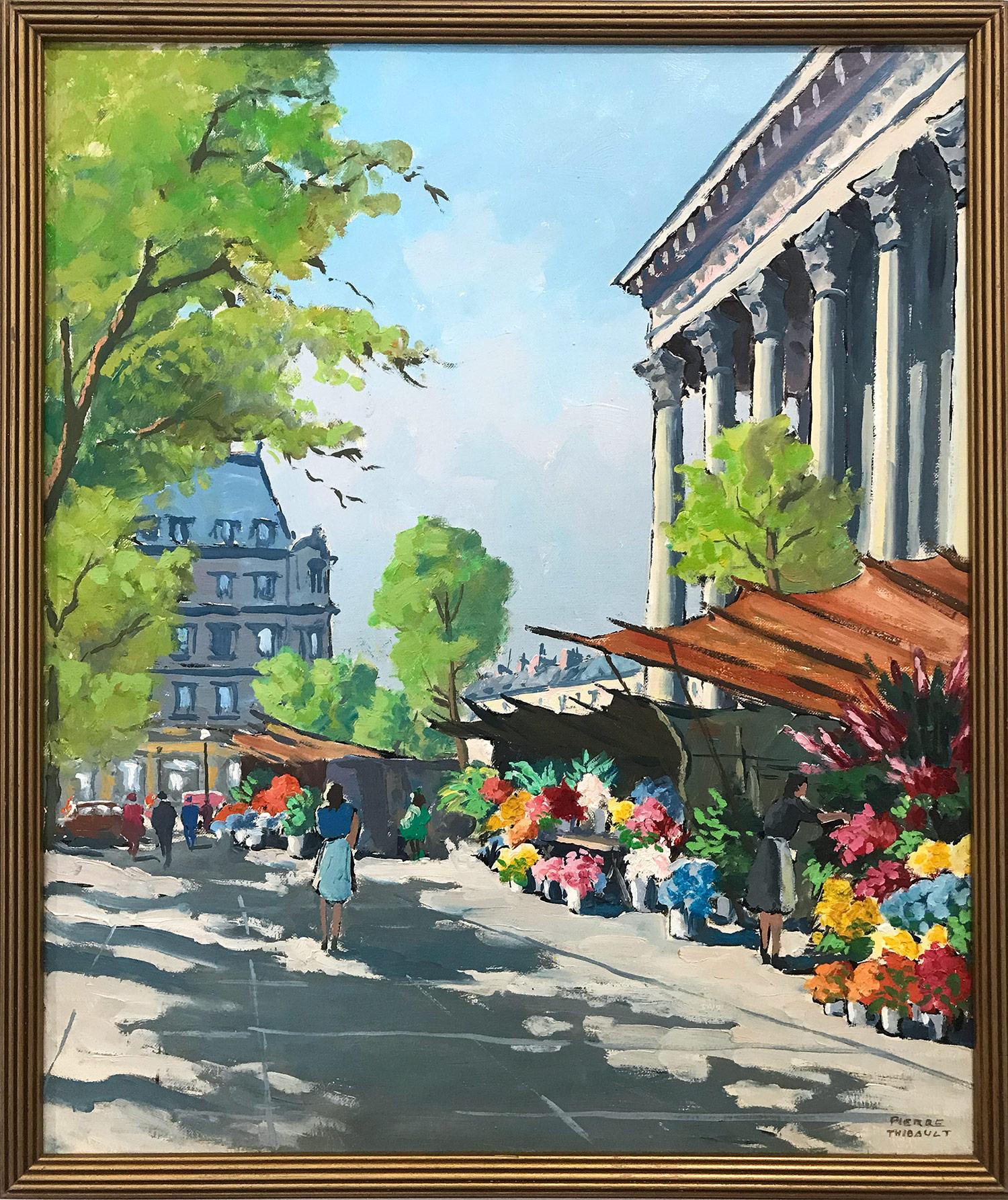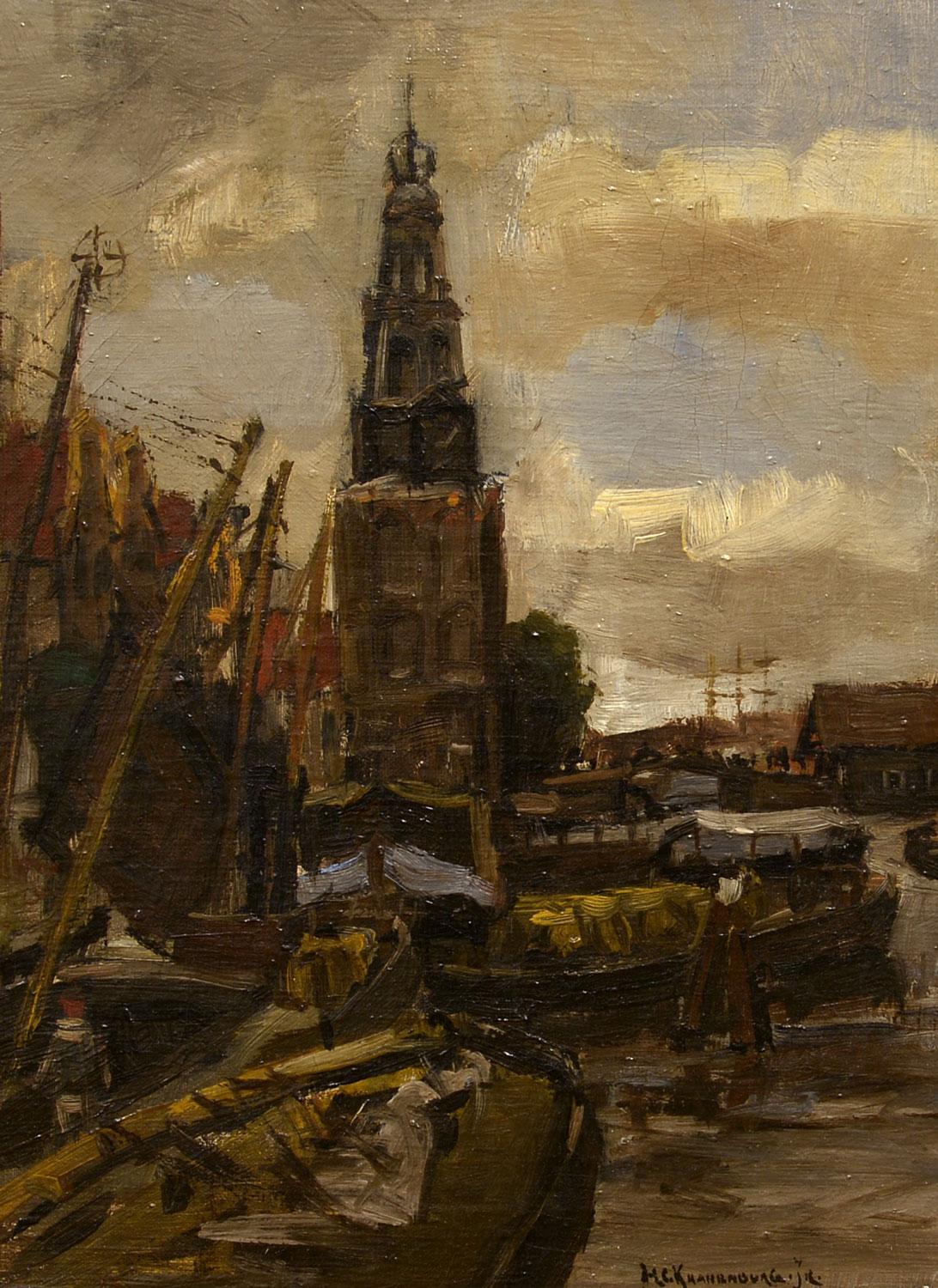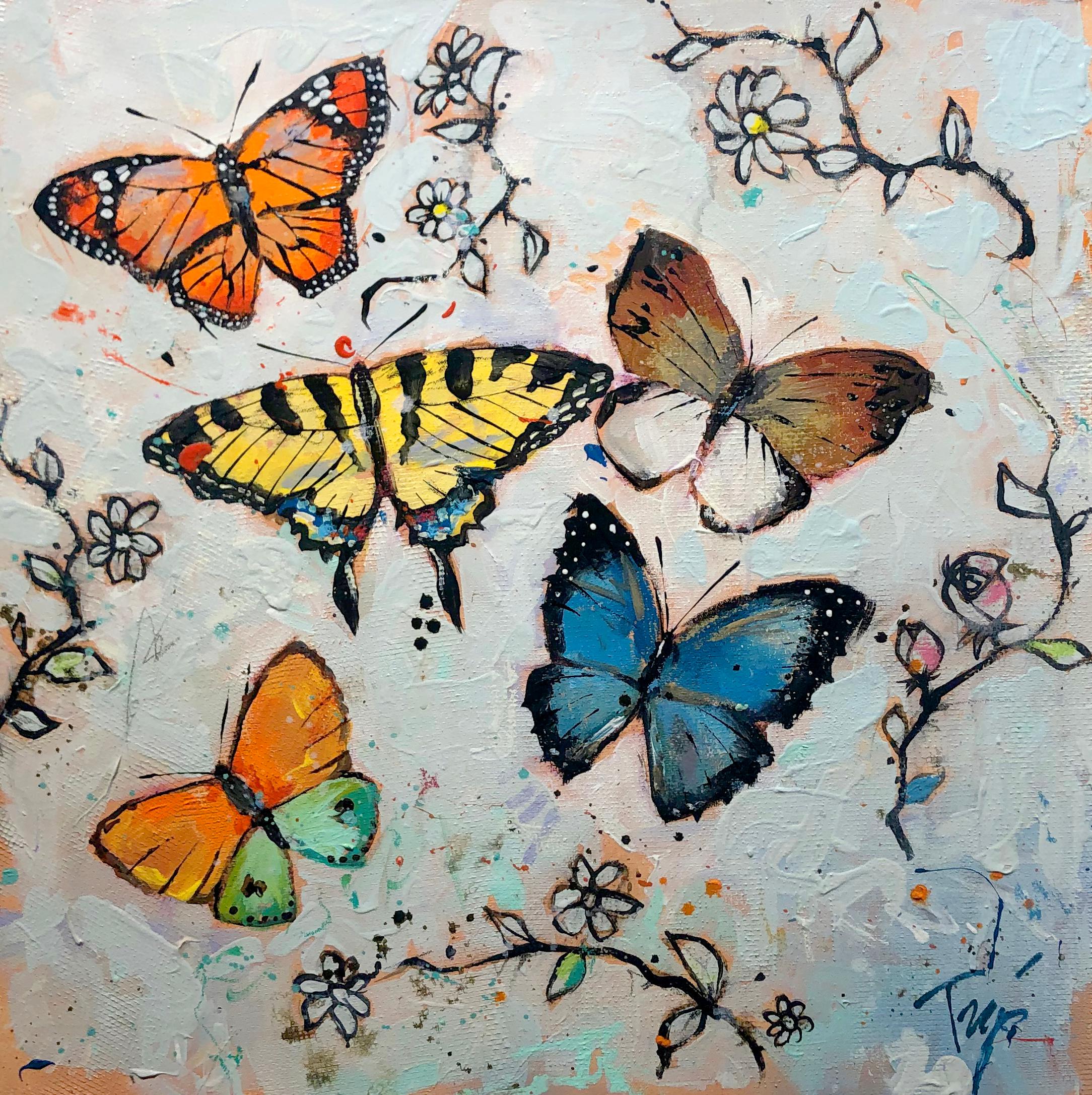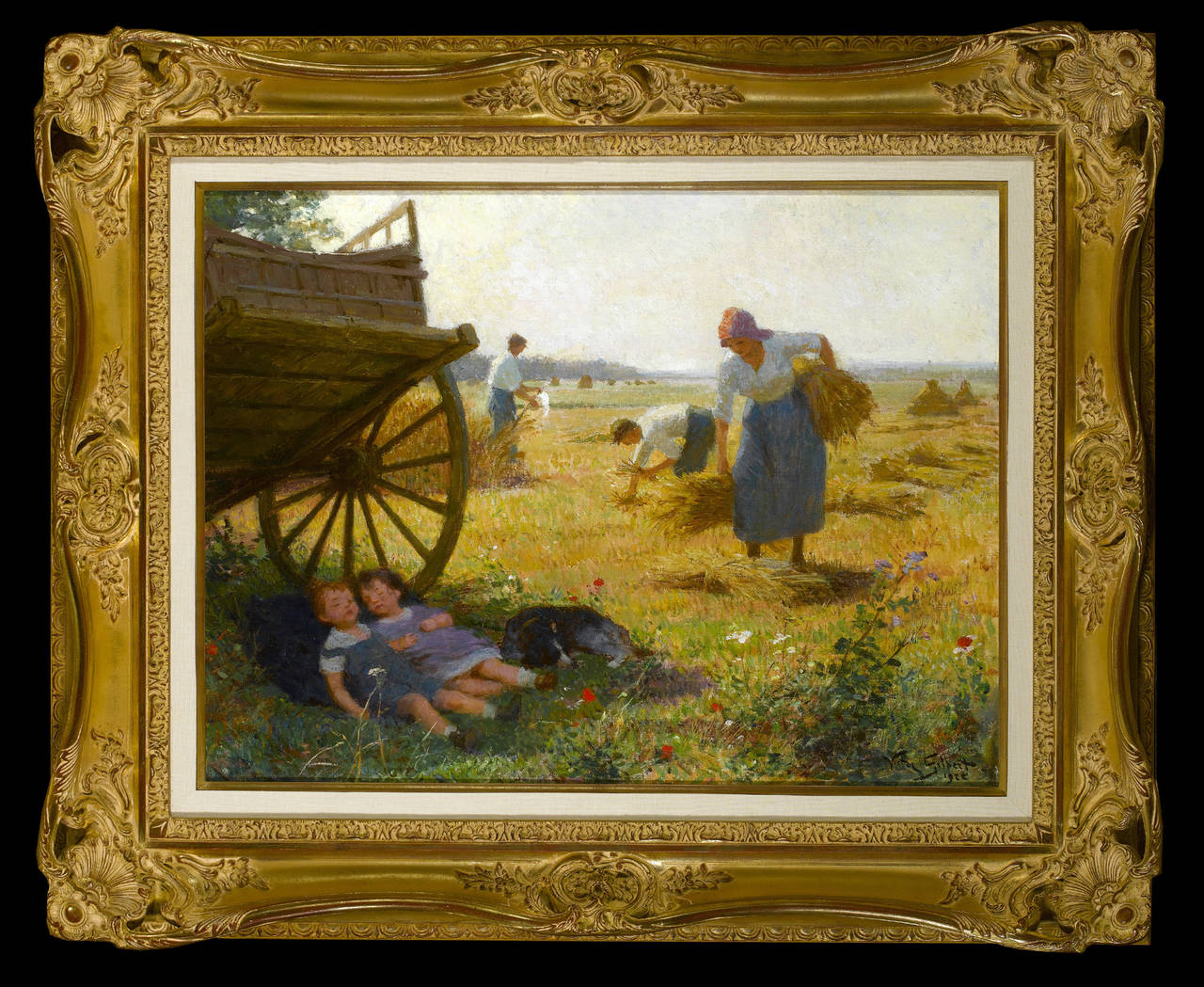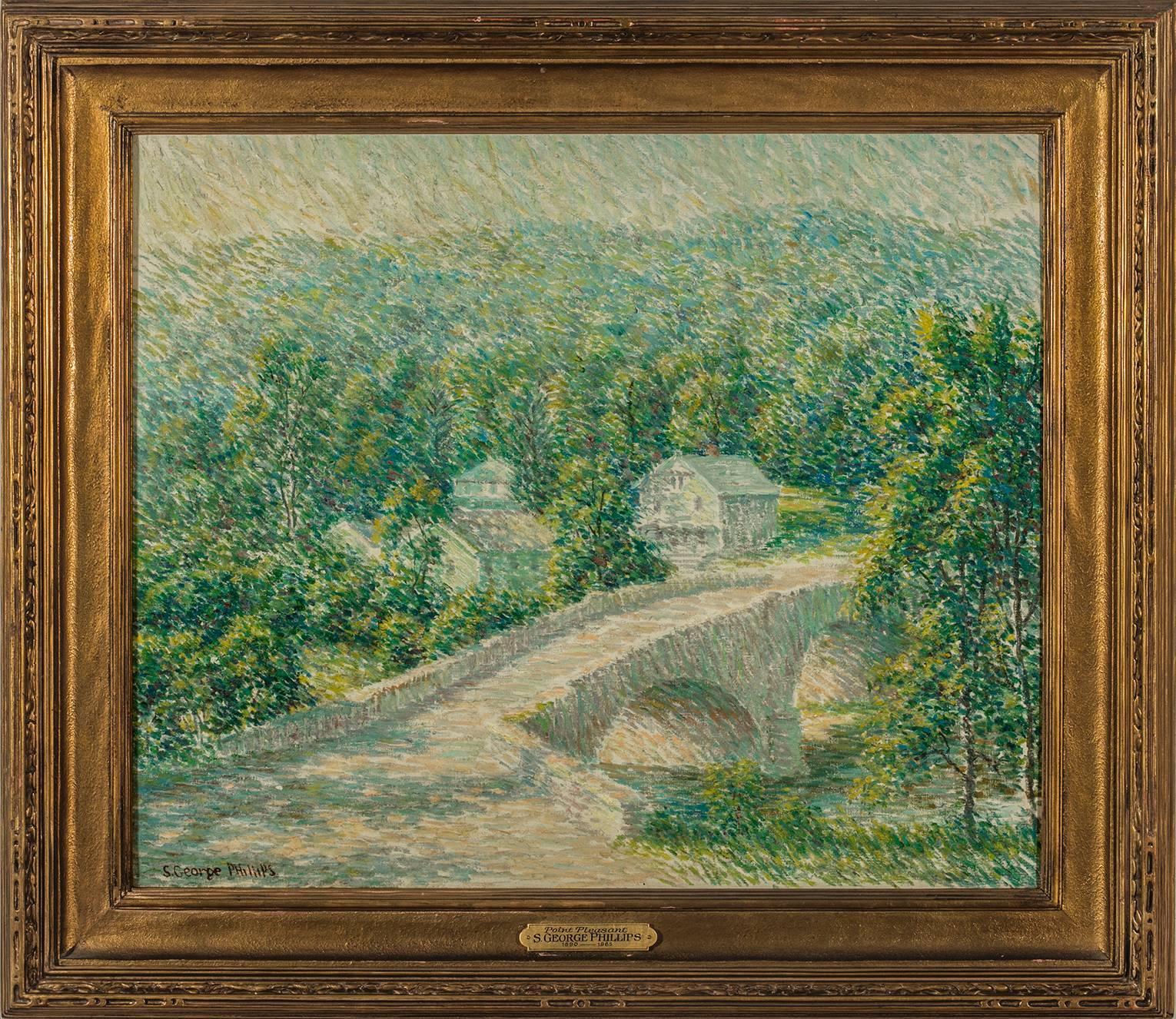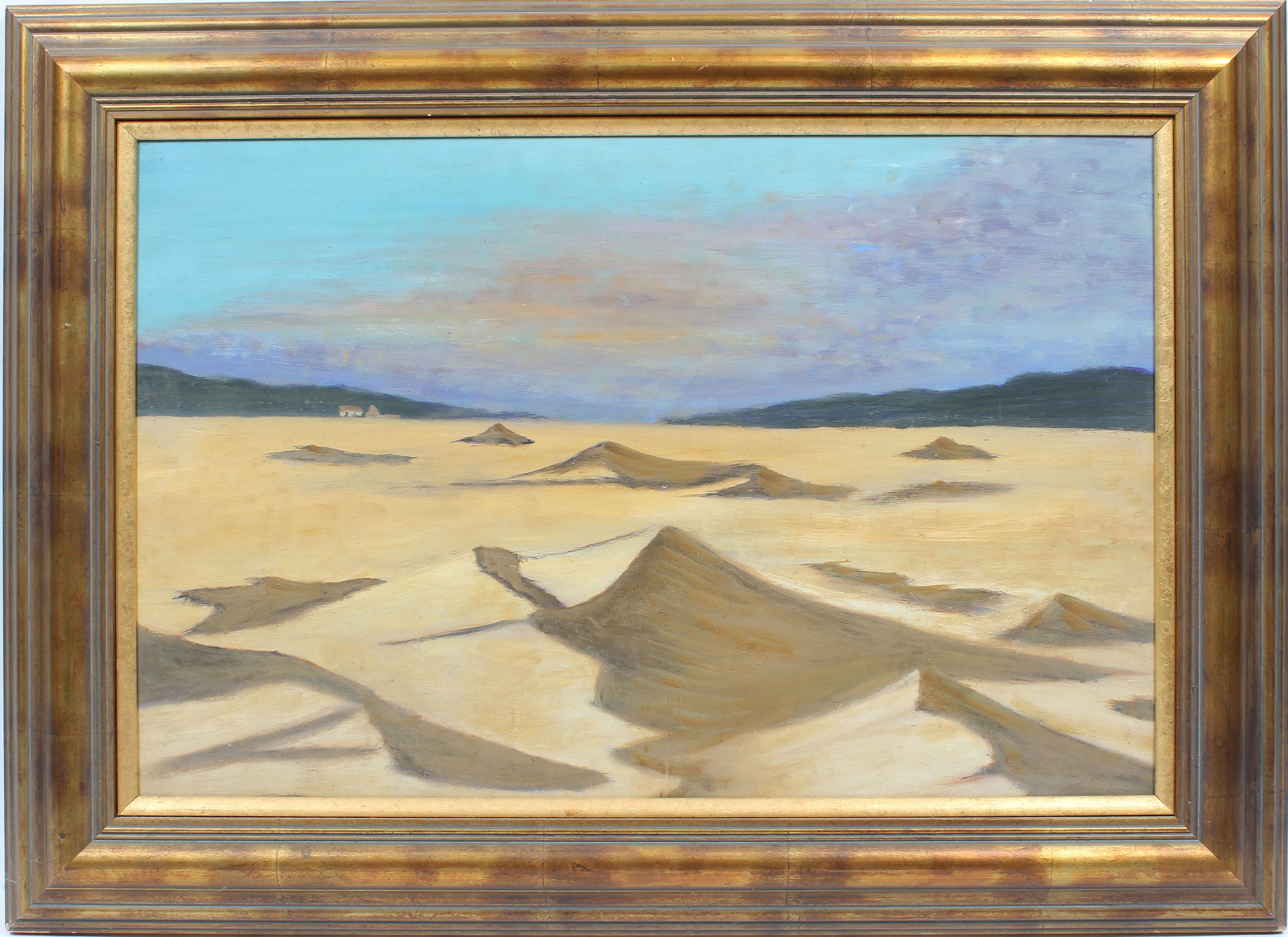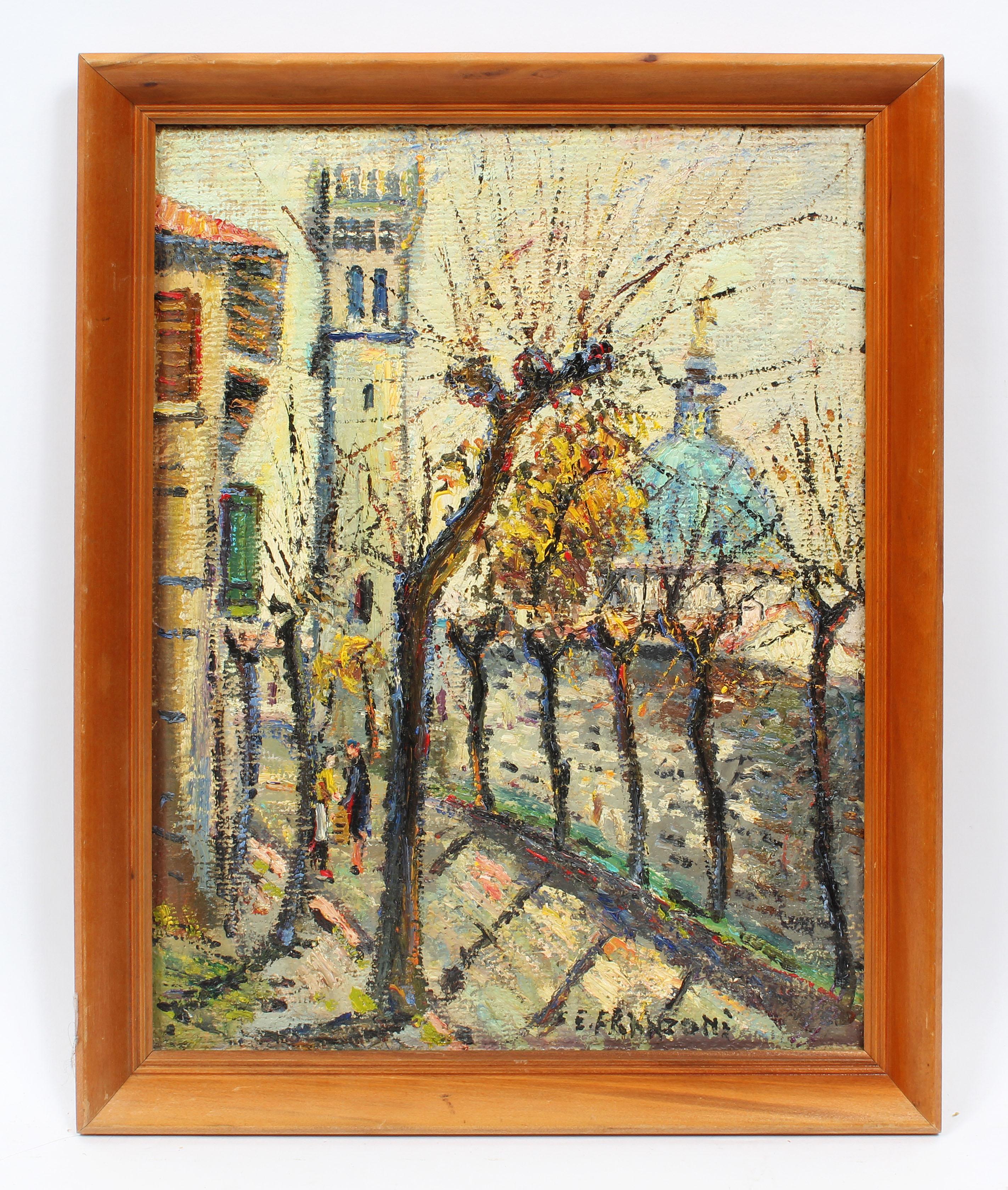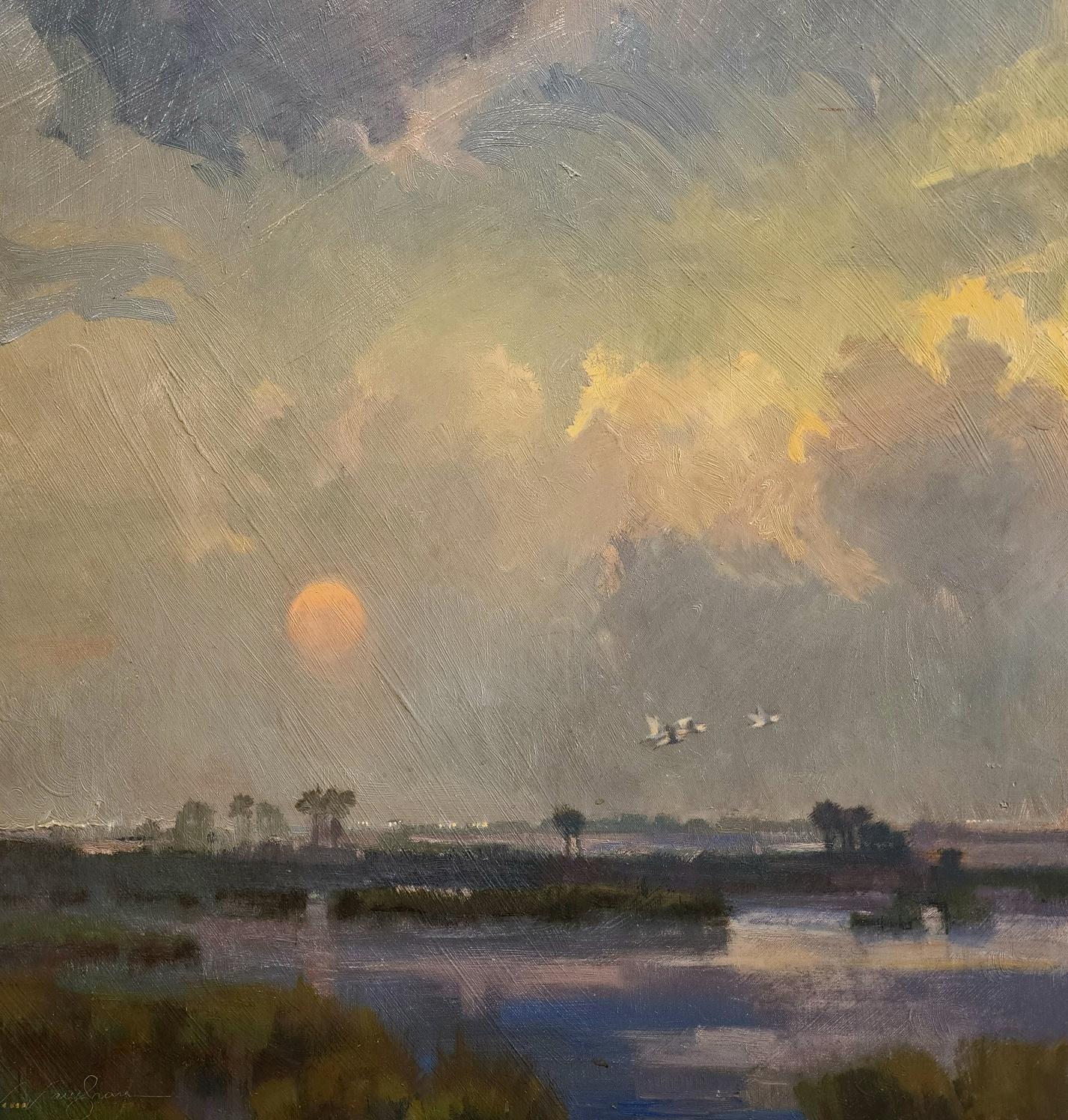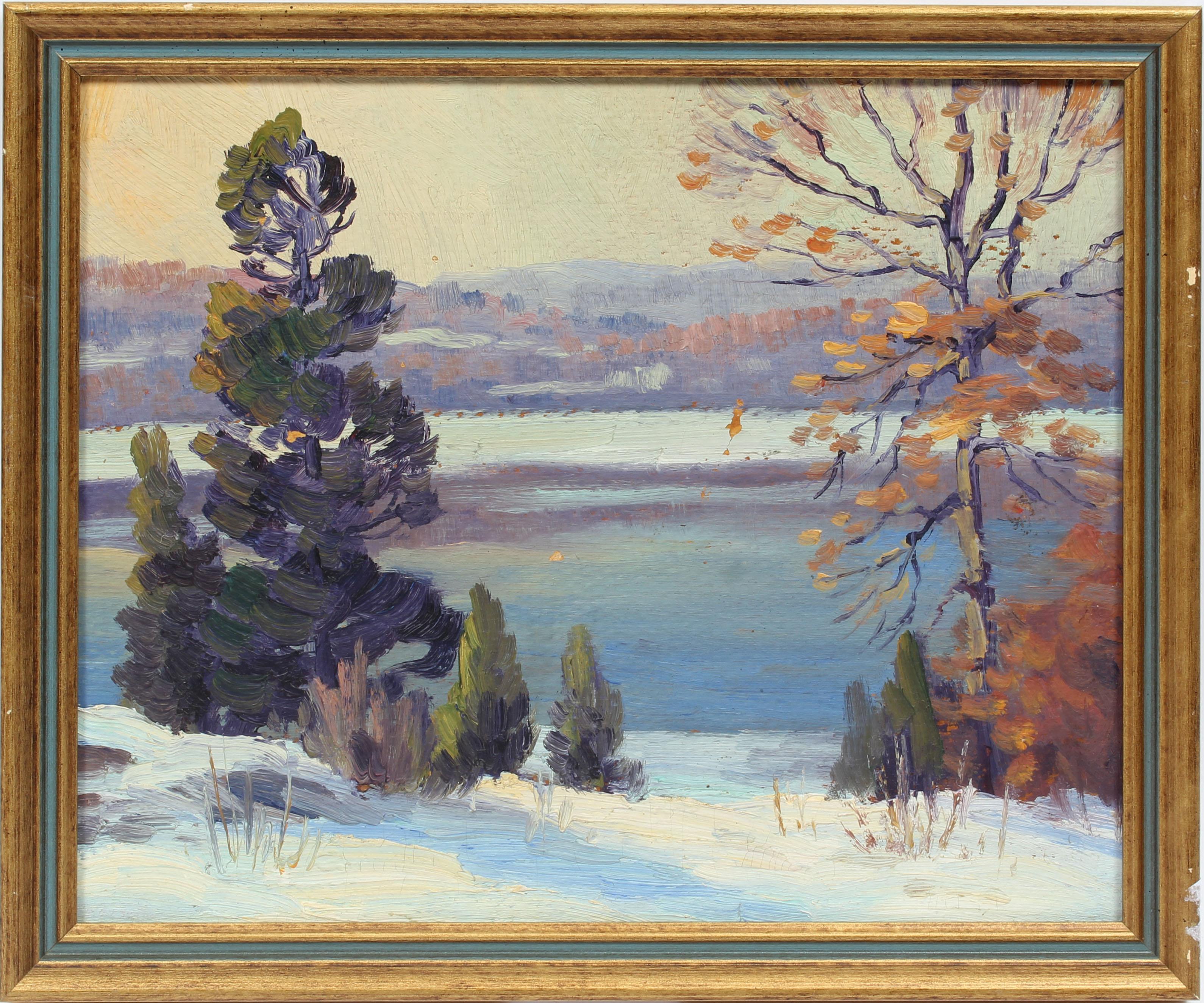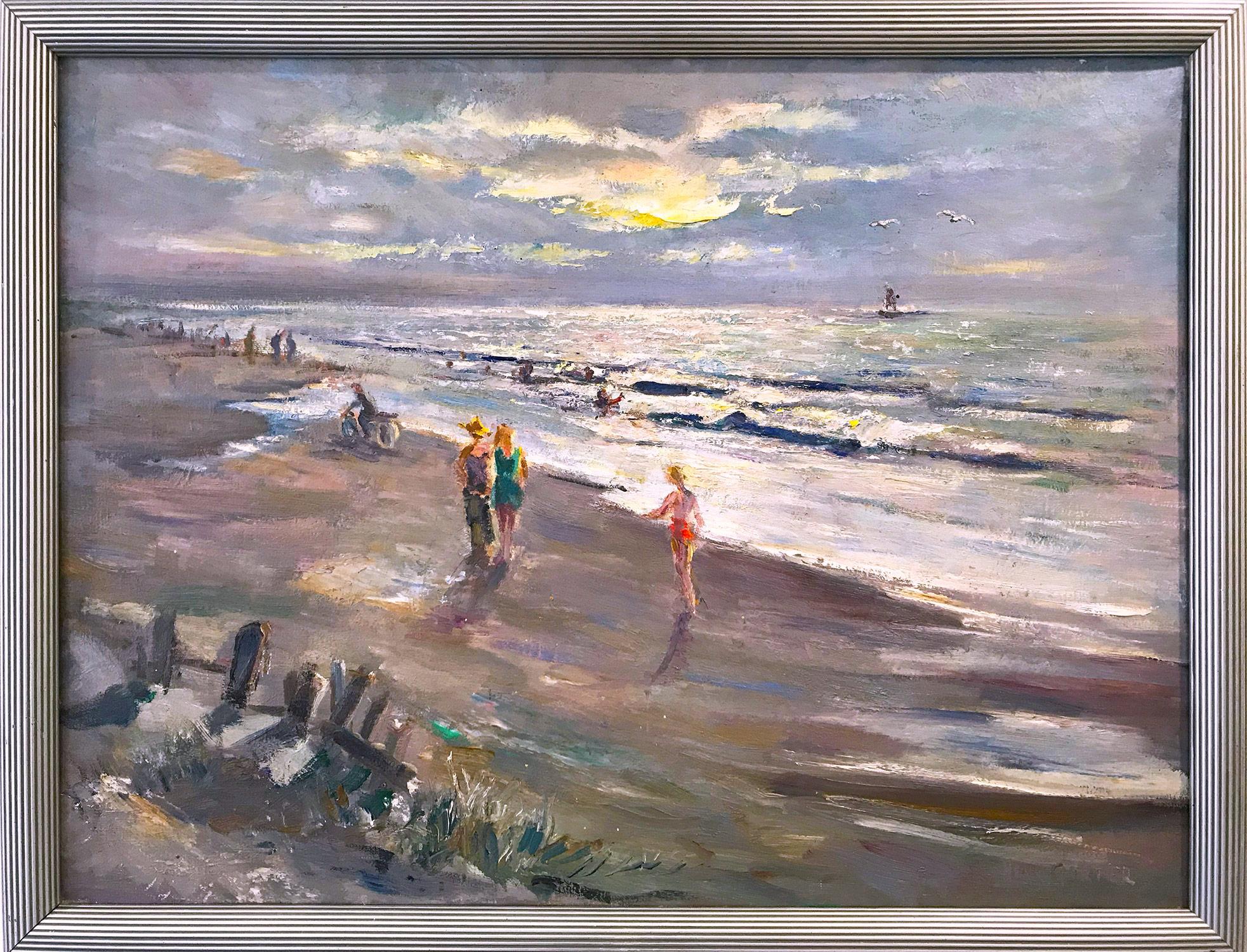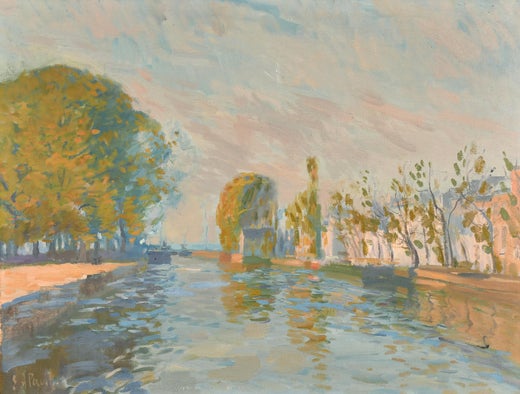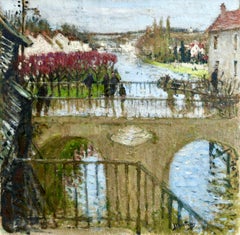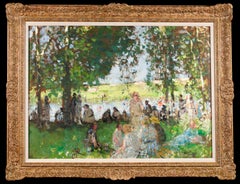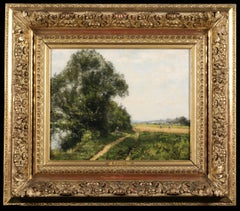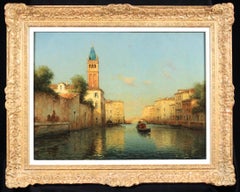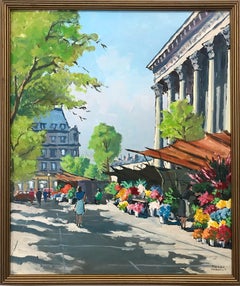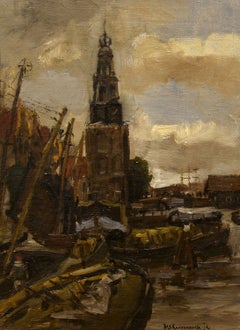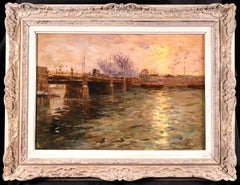
Sunset on the River Seine - Impressionist Oil, Riverscape by Elie Anatole Pavil
View Similar Items
Want more images or videos?
Request additional images or videos from the seller
1 of 14
Elie Anatole PavilSunset on the River Seine - Impressionist Oil, Riverscape by Elie Anatole Pavilc.1910
c.1910
About the Item
- Creator:Elie Anatole Pavil (1873-1948, French)
- Creation Year:c.1910
- Dimensions:Height: 15 in (38.1 cm)Width: 22 in (55.88 cm)
- Medium:
- Movement & Style:
- Period:
- Condition:Excellent condition.
- Gallery Location:Marlow, GB
- Reference Number:Seller: LFA02251stDibs: LU41533311133
Elie Anatole Pavil
Elie Anatole Pavil (Russian, 1873-1949) was born in Odessa, Russia in 1873. He came to Paris in 1892. He established himself in Montmartre, on the Rue Caulaincourt. He had arrived at the high point of La Belle Époque; Pavil dedicated himself to capturing its atmosphere on canvas. For most of the next fifty years, he painted the cafes, the beautiful women, the jazz bands and artist ateliers of Paris. His paintings show an intimate knowledge of the inhabitants of the streets and alleys of Montmartre. Elegant couples dancing, beautiful models posing, working men finishing their day with a drink at the bar---all were captured in Pavil's carefully balanced compositions, many of which show the distinct the influence of Degas and Renoir. He exhibited at the Salon of French Artists from 1905. He got an honorable mention in 1928, silver medal in 1930 and was awarded the Legion of Honor in 1931. Various public buildings in Paris retain his works, as well as the Petit Palais and the Musée d'Art Moderne. Pavil also exhibited at the Salon des Indépendants and the Salon d'Automne. He exhibited at Galerie Charpentier, Galerie Georges Petit, and Galerie Bernheim Jeune. Claude Monet described Pavil's paintings as "little marvels.” Pavil also counted Pissaro among his friends. Pavil continued painting with the same passion until the end of his days. He finished his life in Morocco, another place for which he had a lifelong interest. In 1973 Pavil's atelier was sold at auction in Paris more than 200 works that spanned four decades. His works are in the Musée d'Orsay and the Musée Petit Palais in Paris.
About the Seller
5.0
Platinum Seller
Premium sellers with a 4.7+ rating and 24-hour response times
Established in 2001
1stDibs seller since 2016
703 sales on 1stDibs
Typical response time: 2 hours
Authenticity Guarantee
In the unlikely event there’s an issue with an item’s authenticity, contact us within 1 year for a full refund. DetailsMoney-Back Guarantee
If your item is not as described, is damaged in transit, or does not arrive, contact us within 7 days for a full refund. Details24-Hour Cancellation
You have a 24-hour grace period in which to reconsider your purchase, with no questions asked.Vetted Professional Sellers
Our world-class sellers must adhere to strict standards for service and quality, maintaining the integrity of our listings.Price-Match Guarantee
If you find that a seller listed the same item for a lower price elsewhere, we’ll match it.Trusted Global Delivery
Our best-in-class carrier network provides specialized shipping options worldwide, including custom delivery.More From This Seller
View AllProvencher's Mill - Moret-Sur-Loing - Impressionist Oil, River - Pierre Montezin
By Pierre Eugène Montezin
Located in Marlow, Buckinghamshire
An exceptional oil on canvas circa 1910 by French Impressionist painter Pierre Eugène Montezin depicting figures and a horse & cart on a bridge over the river. Beautifully painted an...
Category
Early 20th Century Impressionist Landscape Paintings
Materials
Canvas, Oil
Les Vacances - Post Impressionist Figures in Landscape Oil by Pierre Montezin
By Pierre Eugène Montezin
Located in Marlow, Buckinghamshire
Signed oil on canvas figures in riverscape circa 1910 by sought after French impressionist painter Pierre Eugene Montezin. The work depicts women dressed in summer dresses and sunhat...
Category
1910s Impressionist Figurative Paintings
Materials
Canvas, Oil
La Fernaison - Impressionist Landscape Oil Painting by Stanislas Lepine
By Stanislas Victor Édouard Lépine
Located in Marlow, Buckinghamshire
Signed figures in landscape oil on canvas circa 1880 by French impressionist painter Stanislas Victor Edouard Lepine. The piece depicts two workers haymaking on a summer's day. A mother nestled in the hedges cradles her baby beside a path and there is a river to the left of the painting.
Signature:
Signed lower right
Dimensions:
Framed: 22"x23"
Unframed: 13"x16"
Provenance:
Private French collection
This work is included in the Catalogue Raisonee of Stanislas Lepine by Manuel Schmit - Supplement 1 / Ref L.1119
Stanislas Victor Édouard Lépine was the pupil of Corot in Paris between 1860 and 1875. His first paintings hardly attracted attention. He would perhaps have remained unknown for a long time if Count Armand Doria, struck by the feeling visible in his landscapes, had not taken him under his protection with Adolphe Félix Cals...
Category
1880s Impressionist Landscape Paintings
Materials
Canvas, Oil
Gondolier on a Canal - Impressionist Landscape Oil Painting by Antoine Bouvard
By Antoine Bouvard Snr.
Located in Marlow, Buckinghamshire
Signed impressionist landscape oil on canvas circa 1930 by French painter Antoine Bouvard Snr. The work depicts a gondolier sailing a gondola on a Venetian Canal. The last light of t...
Category
1930s Impressionist Landscape Paintings
Materials
Canvas, Oil
Pont Neuf - Evening - 19th Century Oil, Riverscape at Night by A E Othon Friesz
By Achille-Émile Othon Friesz
Located in Marlow, Buckinghamshire
THIS WORK IS CURRENTLY ON LOAN TO THE MUSEUM OF MODERN ART IN LE HAVRE AND IS BEING EXHIBITED IN THEIR ELECTRIC NIGHTS EXHIBITION 2020
A stunning oil on original canvas by Achile-Emile Othon Friesz depicting a night time view of the Pont Neuf bridge over the Seine, Paris. The painting shows deep blues and reds - richer than those of traditional impressionist paintings - and shows the transition into Fauvism. Signed and dated 1903 lower right. Framed dimensions are 24.5 inches high by 20 inches wide.
Achille Friesz was the son of a family of sailors from Le Havre. From 1885 he often spent time in Marseilles visiting his maternal uncles. As a child he dreamed of going to sea, but from the age of 12 he developed a passion for art, and after secondary school he attended the École des Beaux-Arts in Le Havre. There, from 1896 to 1898, he studied under Charles-Marie Lhullier who had been a friend of Jongkind and whom, like Dufy and Braque, he remembered fondly throughout his life. Lhullier introduced his students to the work of Chardin, Corot, Géricault and Delacroix.
After receiving a bursary from the local authorities in 1898, he went to Paris and, while his friends Matisse, Rouault and Marquet studied under Gustave Moreau, enrolled at the École des Beaux-Arts at the studio of Léon Bonnat, where he was joined by Dufy. However, he scarcely attended the studio, preferring to go to the Louvre and make copies of the works of Clouet, Veronese, Rubens, Claude Lorraine and Delacroix. He did his military service in Paris in 1902 but continued with his art. Around this time he met Camille Pissarro and sought his advice.
As a young man he began to make frequent trips away, not necessarily travelling very far, but looking for subjects for his work, usually landscapes. Among the places he visited were the Creuse region around 1903, Antwerp in 1905, returning there with Braque in 1906, and La Ciotat, Cassis and L'Estaque in 1906-1907, again in the company of Braque. In Paris he frequently moved lodgings until 1914. He moved in with Henri Matisse at the Couvent des Oiseaux from 1905-1910, that is to say at the period when Fauvism was at its height. In 1908 he returned to his native Normandy to reimmerse himself in his early environment; he would return to the region throughout his life. He made a trip to Munich with Dufy in 1909, and visited Portugal in 1911-1912 and Belgium in 1912. In 1914 he was called up and assigned to technical services, not being demobilised until March 1919, although he did manage to maintain a certain independence. From 1914 until his death he lived in Paris at 73 Rue Notre-Dame-des-Champs, where he occupied Bouguereau's old studio. He made frequent trips to Cap-Brun near Toulon where, in 1923, he acquired a property called Les Jarres, as well as making numerous visits to Normandy and Le Havre.
In 1925 he received the highest commendation at the Carnegie Prize in Pittsburgh for Portrait of the Decorative Artist Paul Paquereau. Also in 1925, at the same time as Matisse, he was made a Chevalier of the Légion d'Honneur, rising to in Officier in 1933 and Commandeur in 1937. He was also made Commander of the Swedish order of Vasa in 1934. Throughout his life, Friesz was a teacher: from 1913 at the Académie Moderne; from 1929 at the Académie Scandinave; and from 1941 until his death at the Académie de la Grande-Chaumière.
Alongside his activity as a painter, he illustrated several works of literature, including: in 1920 Le Pacte de l'Écolier Juan by Jules Tellier; in 1924 Échelles de Soie by Jean Pédron; in 1926 Le Jardin sur l'Oronte by Maurice Barrès; in 1926 En Suivant la Seine by Gustave Coquiot; in 1929 Rouen by André Maurois; in 1931 The Song of Songs; in 1934 Poésies by Pierre de Ronsard; in 1945 Le Bouquet de la Mariée by Gabriel-Joseph Gros; in 1947 Paul et Virginie by Bernardin de St-Pierre; in 1949 Le Livre de Job by Pierre Poussard; in 1949 Petronius's Satyricon, and in 1949 a collection of 12 unpublished lithographs for Le Désert de l'Amour by François Mauriac. He also designed several pieces of decorative art: from 1906 to 1909 ceramics executed by Metthey among others; a façade for a private house in Le Havre; a china service for two for the Le Havre writer J.-G. Aubry; vases, dishes and plates; in 1912 four sets for La Lumière by Georges Duhamel, performed at the Odéon; in 1916 a screen for the Le Havre collector Léon Pédron; in 1918 panels for Pédron's dining room; in 1920 a mural entitled Children Dancing (Enfants Dansant); in 1920 Les Volières for the apartment of Vicomte Amédée de Flers; in 1935 Peace (La Paix), a Gobelins tapestry presented by France to the Palais des Nations in Geneva; in 1937 La Seine in collaboration with Dufy for the Palais de Chaillot, with each artist taking half of the river's course - From the Source to Paris by Friesz and From Paris to the Estuary by Dufy.
The Fauves were producing Fauve paintings before they knew it: it was not until the critic Louis Vauxcelles saw their work at the Salon des Indépendants in 1905 and mockingly used the word Fauve to describe it that the term was born. It is known that Vlaminck and Derain worked together and that the École de Chatou was composed of just these two artists. Friesz was living with Matisse and after his first trip to Antwerp in 1905, he returned in 1906 with Braque. In 1906-1907 Friesz and Braque went to La Ciotat to paint and there they met up with Matisse. The paintings Friesz produced in Antwerp are Fauve inasmuch as they are painted in pure colours and are more or less free of the divisionism of the Impressionists, although the draughtsmanship is fairly standard; these works include The Port, The Escaut, The Canals, The Dock with Sailing Ships and The Red Slipway. Those of Braque the following year, in particular Terrace on the Escaut, show great similarities with those Friesz painted of the same subject. Friesz was already avoiding the hardness of pure flat tints by graduating them in thin glazes, allowing the whiteness of the canvas to penetrate the transparency, a technique that came to characterise his entire Fauve period.
At La Ciotat Friesz and Braque adopted completely different Fauve styles, with Braque composing his paintings on horizontal and vertical orthogonals painted in small, regular, spaced-out touches, whereas Friesz developed his own personal rhythmical style of wide arabesques of colour in works such as The Bec-de-l'Aigle, Women Bathing and L'Estaque. Many of Friesz's Fauve works were produced in the south of France, and his Portrait of Fernand Fleuret also dates from this period.
When he returned to Normandy in 1908 the period that he described as his 'return to form' began; with compromise paintings such as Entrance to the Port of Honfleur, Côte de Grâce Landscape, The 'Bains Marie-Christine' in Le Havre and the great compositions characteristic of this period - Autumn Labours, Spring, Fisherman on a Rock and Women Bathing. His draughtsmanship retains something of the rhythm of the Fauve period, his figures following the lines of the landscape and the colour remaining clear and resonant. In 1909 he painted the Cirque Médrano series: The Trapeze Artist, The Clown and The Horsewoman. In the south of France he also painted the Olive Trees series. He made a trip to Munich with Raoul Dufy resulting in Winter in Munich. This was also the year of his first trip to Italy. Boat in a Rocky Inlet of 1910 marks one of the pivotal points between a totally rhythmic drawing style of sensual curves typical of his Fauve period and a reduced palette of muted ochres, browns and blues. From 1910 onwards, the final traces of Fauvism become less and less apparent in his work. His use of colour follows the same course, towards the transcription of reality, with broken tones, ochres and browns.
After his demobilisation, as well as in his studio in Paris, Friesz spent time in his house in Toulon, returned to Normandy and Le Havre and continued to make frequent, often local, forays in search of new subjects: in 1919 to Jura, producing the series Forests, Pine Trees, Road in the Snow and Invitation to Skate; in 1920 to Italy producing Piedmont Village, Florence Grape Pickers; in 1920 to Le Havre, producing The Étretat Cliffs, People Bathing at Étretat; in 1923 to his house in Toulon, producing View of Coudon, Women Bathing, Grape Harvesting, Jars; in 1924 he painted the Large Nude (which he exhibited at the Salon d'Automne the same year) and landscapes of Toulon; in 1928 he made a trip to Algiers, producing The Algiers Kasbah and its Phantoms; in 1931 to Annecy, producing Women Bathers by a Lake; in 1934-1935 to Dinan and St-Malo producing The Great Dinan Viaduct, The Dock with the Terre-Neuvas, After Bathing; in 1936 to Honfleur; in 1941-1944, remaining in Paris because of the war, he painted mainly still-lifes, including Studio Corner, Earthenware. In 1946 he returned to Honfleur; and in 1947 to La Rochelle producing The Port Tower, Tuna Boats, The Red Sail.
Numerically Friesz's work is dominated by landscapes but it should be remembered that throughout his career he tackled more ambitious compositions and appeared to do so with great ease. These include Boat in a Rocky Inlet of 1910 with its frolicking women bathers, Allegory of War of 1915 executed in 24 hours, Invitation to Skate of 1919, numerous paintings of Women Bathing over several periods and much later Women beside a Pond of 1944, which clearly demonstrates his attachment to Cézanne.
He exhibited at the Salon des Artistes Français from 1901 to 1903 and then at the Salon des Artistes Indépendants. From 1906 he exhibited annually at the Salon d'Automne, of which he later became a committee and jury member. In 1923 he took part in the founding of the Salon des Tuileries and became head of two of the Salon's sections. His work has been exhibited at countless group exhibitions all over the world. Among the most recent thematic exhibitions is Fauvism in Black and White. From Gauguin to Vlaminck, Fauvist Engraving and its Setting (Le Fauvisme en Noir et Blanc. De Gauguin à Vlaminck, l'Estampe des Fauves et son Environnement) at the Musée d'Art Moderne in Villeneuve d'Ascq in 2001.
He also showed his work in numerous solo exhibitions in Paris: his first in 1904 at the Galerie des Collectionneurs and another the same year at the Société des Peintres du Paris Moderne...
Category
Early 1900s Impressionist Landscape Paintings
Materials
Canvas, Oil
A view from the Pont Neuf - Impressionist Landscape Oil by Charles Guilloux
By Charles-Victor Guilloux
Located in Marlow, Buckinghamshire
Signed and dated oil on canvas riverscape by French impressionist painter Charles-Victor Guilloux. This beautifully painter piece shows a view from the Pont Neuf looking towards the ...
Category
Early 1900s Impressionist Landscape Paintings
Materials
Canvas, Oil
You May Also Like
"Still Life w/ Daises", Henni de Korte, 23x27, Oil on Canvas, Impressionism
Located in Dallas, TX
"Still Life with Daisies" by Henni de Korte measures 23x27 and is available for $9,500. Daises over flow a green vase sitting on top of a gold and red t...
Category
1990s Impressionist Landscape Paintings
Materials
Canvas, Oil
"Flower Stand by the Madeleine" French Impressionist Oil Painting on Canvas
By Pierre Thibault
Located in New York, NY
Pierre Thibault was a renowned French artist and known for his figurative paints depicting Parisian life in the 20th Century. Mainly street scenes of the bustling city of Paris and i...
Category
Mid-20th Century Impressionist Landscape Paintings
Materials
Canvas, Oil
"Along the Canal, Amsterdam, " Hendrik Cornelis Kranenburg, Sr., Impressionist
Located in Wiscasset, ME
Hendrik Cornelis Kranenburg, Sr. was a Dutch artist who lived from 1871 to 1948. He is best known for his oil paintings of cities, including Amste...
Category
Early 20th Century Impressionist Landscape Paintings
Materials
Canvas, Oil
Trip Park, "Hippie Flies", Whimsical Butterfly Floral Oil Painting on Canvas
Located in Saratoga Springs, NY
Trip Park's "Hippie Flies" is a 24x24 oil painting on canvas of whimsical colorful butterflies surrounded by flower branches on a pale blue background with o...
Category
2010s Impressionist Animal Paintings
Materials
Canvas, Oil
French landscape painting with children, figures & field Scene 'The Harvest'
By Victor Gabriel Gilbert
Located in Shrewsbury, Shropshire
'The Harvest' is a stunning pastoral scene by Victor Gabriel Gilbert.
Victor Gabriel Gilbert was born in Paris, 13th February 1847. He studied for a perio...
Category
Late 19th Century Impressionist Landscape Paintings
Materials
Canvas, Oil
"Repairing the Nets", Henni de Korte, 19x23 in, Oil on Canvas, Impressionism
Located in Dallas, TX
"Repairing the Nets" by Henni de Korte measures 19x23 and is available for $8250. Fishing boats are docked in a quiet cove of a village while the fisher...
Category
1990s Impressionist Landscape Paintings
Materials
Canvas, Oil
